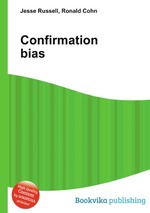Confirmation bias
Jesse Russell Ronald Cohn
бумажная книга
High Quality Content by WIKIPEDIA articles! Confirmation bias (also called confirmatory bias or myside bias) is a tendency for people to favor information that confirms their preconceptions or hypotheses regardless of whether the information is true. As a result, people gather evidence and recall information from memory selectively, and interpret it in a biased way. The biases appear in particular for emotionally significant issues and for established beliefs. For example, in reading about gun control, people usually prefer sources that affirm their existing attitudes. They also tend to interpret ambiguous evidence as supporting their existing position. Biased search, interpretation and/or recall have been invoked to explain attitude polarization (when a disagreement becomes more extreme even though the different parties are exposed to the same evidence), belief perseverance (when beliefs persist after the evidence for them is shown to be false), the irrational primacy effect (a stronger weighting for data encountered early in an arbitrary series) and illusory correlation (in which people falsely perceive an association between two events or situations).


